BEST SCHOLARSHIPS FOR AFRICAN STUDENTS IN 2025
What they offer, Who’s eligible, How to apply, and How to win
Competition for fully funded international scholarships continues to rise, and 2025 brings updated intakes, new priority fields (climate, agriculture, public health, digital skills), and regional initiatives focused specifically on African development. This guide focuses on the highest-impact scholarships open to African students in 2025 — those that regularly fund large cohorts, offer full tuition + living stipends, and include professional development or leadership programming that strengthens long-term impact back home.
Top global scholarships African applicants should target (with essentials)
1) Mastercard Foundation Scholars Program
What it is: A major philanthropic scholarship program that partners with a network of universities and institutions to support talented young Africans facing financial barriers; support includes tuition, living costs, leadership training and pathways to work. This program targets undergraduate and some postgraduate placements through partner institutions across Africa and globally.
Who it’s for: High-potential students from economically disadvantaged backgrounds in Africa; often requires demonstrated leadership and commitment to community impact.
Typical coverage: Full tuition, accommodation or living allowance, mentorship/leadership development, and strong alumni/employment linkage.
Why it’s powerful: Focus on both education and transition to dignified work — not only degrees but employability. Check partner universities and application routes because many scholars are nominated or selected via institution-specific rounds.
2) Chevening Scholarships (UK)
What it is: UK government’s global scholarship for one-year master’s degrees at any UK university. Highly prestigious and competitive. Covers tuition, living allowance, return flights, and networking events.
Who it’s for: Applicants who demonstrate leadership potential, at least two years’ work experience (or equivalent), and strong plans to return and contribute to their home country.
Typical coverage: Full tuition, monthly stipend, travel, visa support, and access to Chevening networks.
Top tip: Chevening looks for clear leadership examples and a feasible “post-study plan” that shows how your UK study will be used back home. Apply during the annual window — check the Chevening site for exact 2025 opening/closing dates for your country.
3) Commonwealth Scholarships (UK — CSC)
What it is: Funded by the UK government for citizens of low- and middle-income Commonwealth countries (many African countries included), offering full scholarships for master’s and PhD study in the UK under development themes. The Commonwealth Shared Scholarships target candidates who could not otherwise afford the UK degree.
Who it’s for: Citizens of eligible Commonwealth countries with strong academic records and an emphasis on development impact.
Typical coverage: Tuition, living stipend, travel, and often thesis/research support.
Advice: CSC offers special thematic priority lists each year — align your application to the development themes and clearly show how your research/studies support national development.
4) Fulbright Foreign Student Program (USA)
What it is: A flagship US government program funding graduate study and research for non-US citizens — competitive and administered via US embassies and partner organizations in each country. Offers master’s and PhD funding, plus cultural exchange and professional development.
Who it’s for: Graduate students, early-career professionals, and researchers with strong academic and leadership credentials.
Typical coverage: Tuition, living allowance, health insurance, travel, and orientation; program varies by country and U.S. host institution.
Apply via: The Fulbright commission/US embassy in your country — application cycles and requirements vary by country, so check your national Fulbright page for 2025 deadlines and required documents.
5) DAAD Scholarships (Germany) — including regionally focused programs
What it is: The German Academic Exchange Service (DAAD) funds a broad range of scholarships for African students (masters, PhD, short courses) including region-specific calls (e.g., Scholarship East Africa, leadership for Africa programs). DAAD often supports tuition-free study plus monthly stipends, travel and language courses.
Who it’s for: Highly qualified graduates and postgrads seeking study/research in Germany; some DAAD schemes target public-service or development priorities.
Benefits: Monthly stipend, allowances for health insurance, travel, and preparatory German language courses (where required).
Apply early: DAAD calls have specific regional application windows and strict eligibility; read the call text carefully (some are for nationals of specific countries or sectors).
6) Erasmus Mundus Joint Master Degrees (European Union)
What it is: Competitive, fully funded joint master’s programs run by consortia of European universities. Scholarships cover participation costs, travel, and living expenses for selected students of any nationality. Program rotates between partner institutions in different countries.
Who it’s for: Students with a bachelor’s degree seeking a two-year specialized master’s with international mobility built in.
Advantages: Studying across several European countries, strong international career prospects, good stipend and coverage.
Apply to specific Erasmus Mundus programs — each program advertises its scholarship slots and deadlines.
7) Australia Awards (Australia Awards Africa)
What it is: Long-standing scholarships funded by Australia for eligible African countries, focused on development priorities (agriculture, climate, governance, health). Awards fund postgraduate study in Australian institutions and link to development outcomes in the scholar’s home country.
Who it’s for: Mid-career professionals and graduates from eligible African countries with leadership potential and plans to return home.
Coverage: Full tuition, travel, living allowance, and pre-departure training.
Timing: Intake cycles vary; check Australia Awards Africa for country-specific intake info (e.g., 2026 intake closed; 2027 to be announced).
8) Rhodes Scholarships for Africa (Oxford)
What it is: One of the world’s most prestigious scholarships — regionally allocated Rhodes Scholarships (e.g., West Africa) fund study at the University of Oxford. Very competitive; selection emphasizes academic excellence, leadership, and commitment to service.
Who it’s for: Exceptional students (typically younger applicants), with specific regional allocations — check precise eligible countries and age limits (e.g., some Rhodes regional criteria set age cutoffs like under 27 as of a specific date).
Benefits: Full fees, stipend, college accommodation, and access to the Rhodes network.
Note: Careful attention to eligibility (age, degree timing) and to submitting a compelling reference-based dossier are crucial.
9) Scholarships from non-Western partners (China, Turkey, Japan, France)
Quick summary of important options:
- Chinese Government (CSC) Scholarships — full scholarships to Chinese universities; China increased scholarship offers to African students in recent years. (Search your country’s Chinese embassy/CSC portal for 2025 calls.)
- Türkiye Scholarships — competitive, fully funded scholarships for international students, including Africans, for bachelors, masters and PhD programs.
- MEXT (Japan) Scholarships — Japanese government scholarships for undergraduate/graduate study and research.
- Eiffel Excellence Scholarships (France) — for master’s and PhD-level candidates to study in France; highly selective and typically covers tuition and allowance.
(Find details on each country’s government scholarship portals and embassies; application rules and deadlines change annually.)
Regionally targeted and institutional scholarships (Africa-focused)
Africa-wide or regional programs
- African Union Scholarships / Fellowships — periodically AU or regional economic commissions offer scholarships and capacity-building programs targeted at priority sectors (health, governance, STEM). Check AU calls for 2025.
- Regional DAAD or British Council programs — DAAD runs scholarships targeted to West Africa, East Africa, etc.; British Council sometimes runs development scholarship windows for specific countries.
University-level scholarships you should watch
Many top global universities have Africa-specific scholarships, e.g.:
- University-partnered Mastercard Foundation scholarships (e.g., CMU-Africa, other partners).
- Scholarships and fully funded programs at top UK, EU, US and Canadian universities — often via institutional development or diversity funds. Always scan target university pages for country-specific awards.
What these scholarships usually cover (and what they don’t)
Most top scholarships offer:
- Full or partial tuition fees.
- Living stipend / accommodation allowance.
- Return or one-time economy airfare.
- Health insurance and sometimes thesis/research allowances.
- Networking, leadership training, internships or guaranteed work placements (e.g., Mastercard Foundation, Australia Awards).
Less common coverage (check the call text): family travel, partner tuition, summer school fees, or research fieldwork beyond a stated cap. Always read the funding details of each call.
2025 application timeline — when to start and what to expect
General timeline (approximate — confirm exact dates on each program’s site):
- 12–18 months before intake: identify programs, check eligibility, begin preparing documents (transcripts, language tests, references, research proposals).
- 9–12 months before intake: finalize shortlist of target scholarships; schedule tests (IELTS/TOEFL, GRE if needed).
- 6–9 months before intake: draft personal statements, request references, and complete online profiles.
- 3–6 months before intake: submit applications — most major scholarships open windows once per year (Chevening, Commonwealth, Erasmus EMJMD, DAAD calls).
- 1–4 months after application: interviews & selection rounds; if shortlisted, prepare for virtual interviews and presentation of a clear plan for impact post-study.
Because some programs (e.g., Australia Awards Africa) publish intake-specific notices (e.g., 2026 closed; 2027 to be announced), check each program’s official portal for 2025/26 cycles and country-specific application windows.
Application checklist — documents commonly required
Prepare polished copies (scans and PDF) of:
- Valid passport or national ID.
- Degree transcripts and certificates (attested if required).
- Academic CV (2–3 pages).
- Motivational/personal statement (tailored to each scholarship).
- Research proposal or study plan (for research/PhD scholarships).
- Two to three strong referees (academic + professional where requested).
- Language test score (IELTS/TOEFL) — check if required or exempt.
- Work experience proof (employment letters) for programs that require it (e.g., Chevening).
- Police clearance or medical exam (often requested at later stages).
- Any country-specific forms (e.g., Fulbright local nominations).
Tip: Have signed, dated reference letters ready early — many referees need 2–4 weeks to produce a quality letter.
How to make your application stand out — proven strategies
- Match your application to the scholarship’s stated goals. If a scholarship prioritizes development leadership (Commonwealth, Australia Awards), clearly show measurable community outcomes and how your study will help.
- Tell a clear “post-study impact” story. Especially for government scholarships (Chevening, Commonwealth, Australia Awards), explain how you will use the skills back home — concrete projects or employer pathways are great.
- Use strong references that add new evidence. Choose referees who can speak specifically to your leadership, academic capacity, and potential to benefit from the scholarship.
- Showcase leadership with metrics. “Led a project” is weaker than “led a team of 10 to raise funding of $5,000 and delivered training to 200 farmers” — quantify results.
- Start early and tailor each personal statement. Admissions panels can spot recycled generic essays. Address selection criteria directly and use examples.
- Practice for interview rounds. Mock interviews with mentors and recorded answers improve confidence and clarity.
- Leverage partnerships. Programs like Mastercard Foundation operate via university partners — apply through these pathways and ensure your application to the host university is also strong.
Language and testing — what to know for 2025
- English tests: Most UK/US/AU/EU programs ask for IELTS/TOEFL unless you studied previously in English. Check exemptions.
- GRE/GMAT: Required for some US or research programs; many scholarship schemes have waived GRE recently for certain calls — confirm per program.
- Begin tests early — scores are valid only for a limited period.
Country-specific notes (short)
United Kingdom (Chevening, Commonwealth, university scholarships)
- Chevening is a one-year UK master’s scholarship with strict work experience and return requirements. Apply during Chevening’s annual window for your country.
United States (Fulbright)
- Fulbright cycles and selection are handled country-by-country; early contact with your local Fulbright commission is crucial.
Germany (DAAD)
- DAAD runs numerous targeted calls for African regions. Some include pre-study language courses and tie into development priorities.
Australia (Australia Awards)
- Australia Awards Africa focuses on development impact fields and mid-career professionals; intakes can be occasional and country-specific. Watch their website for the next intake announcements.
Common pitfalls to avoid
- Applying late — many scholarships have strict cutoffs and do not accept late documents.
- Generic essays — failing to align your goals with the scholarship’s mission loses points.
- Weak referees — referees who provide vague or lukewarm letters undermine your case.
- Ignoring eligibility criteria — age or degree timing restrictions (e.g., Rhodes age limits) can disqualify you — read the fine print.
Additional resources and portals to monitor (2025)
- Official program pages: Mastercard Foundation, Chevening, Commonwealth CSC, Fulbright, DAAD, Erasmus+, Australia Awards Africa, Rhodes Trust. (I used these official pages to compile the program summaries above.)
- University scholarship pages: once you have target programs, check host-university scholarship pages for additional funding (often unadvertised nationally).
- National ministry/embassy pages: some country governments coordinate nominations (especially for Fulbright and other bilateral scholarships).
Quick comparison table (summary — pick 3 to focus on)
- Mastercard Foundation — Africa-focused, broad partner network, strong employability wraparound.
- Chevening (UK) — one-year master’s, leadership focus, requires work experience.
- Commonwealth (UK) — development themes, multi-year support for eligible Commonwealth citizens.
- Fulbright (USA) — research & graduate study, country-based admin, cultural exchange.
- DAAD (Germany) — many regionally targeted scholarships, strong for STEM and research.
Frequently Asked Questions (FAQ)
Q: Which scholarship is easiest to win?
A: None are “easy” — but targeted or regional scholarships (e.g., DAAD regional calls, country-specific Fulbright windows, some Mastercard Foundation partnerships) sometimes have less global competition than global calls. “Easiest” depends on fit and how well you demonstrate eligibility and impact.
Q: Can I apply to several scholarships at once?
A: Yes — but check each scholarship’s rules on simultaneous awards (some awardees cannot hold two major scholarships at once). Prioritize top fits and manage workload to produce high-quality applications.
Q: How important are interviews?
A: Very — many programs short-list candidates for interviews. Practice clear, concise answers about your leadership examples, study plan, and post-study impact.
Final checklist before you submit
- Verify eligibility and deadlines on the official scholarship page. (Links in the citations are the authoritative sources used for this guide.)
- Get references in writing and confirm they can submit online forms or email signed letters.
- Tailor each personal statement to selection criteria; use measurable impact statements.
- Have official transcripts translated and attested if required.
- Prepare for tests and interviews early.
Closing — next steps for you
- Pick 3–5 scholarships from the list above that match your level (undergrad, master’s, PhD), field, and country eligibility.
- Visit each program’s official country page (see citations) to confirm the 2025 intake timing and apply per instructions.
- If you want, tell me: your target degree (BSc/MSc/PhD), field of study, country of residence, and test scores (if any). I’ll draft tailored personal-statement bullets and a prioritized application timeline for your exact profile.
![]()
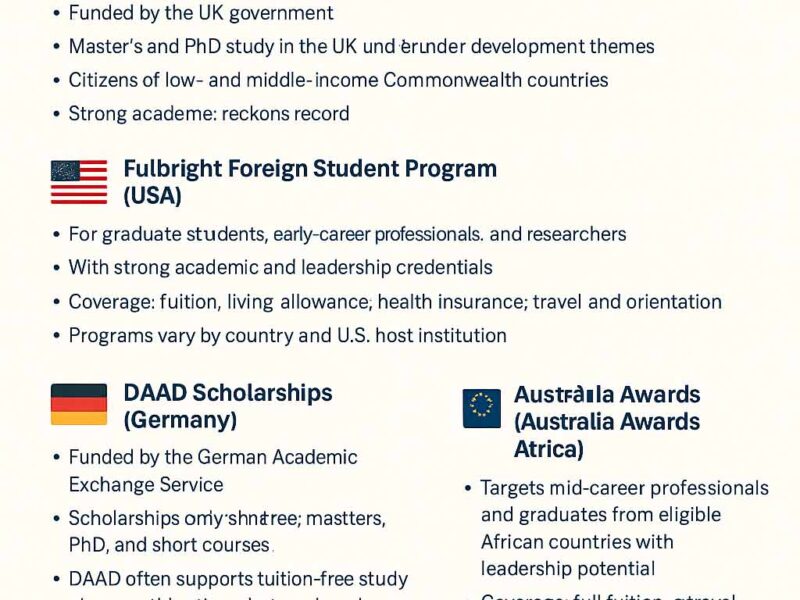
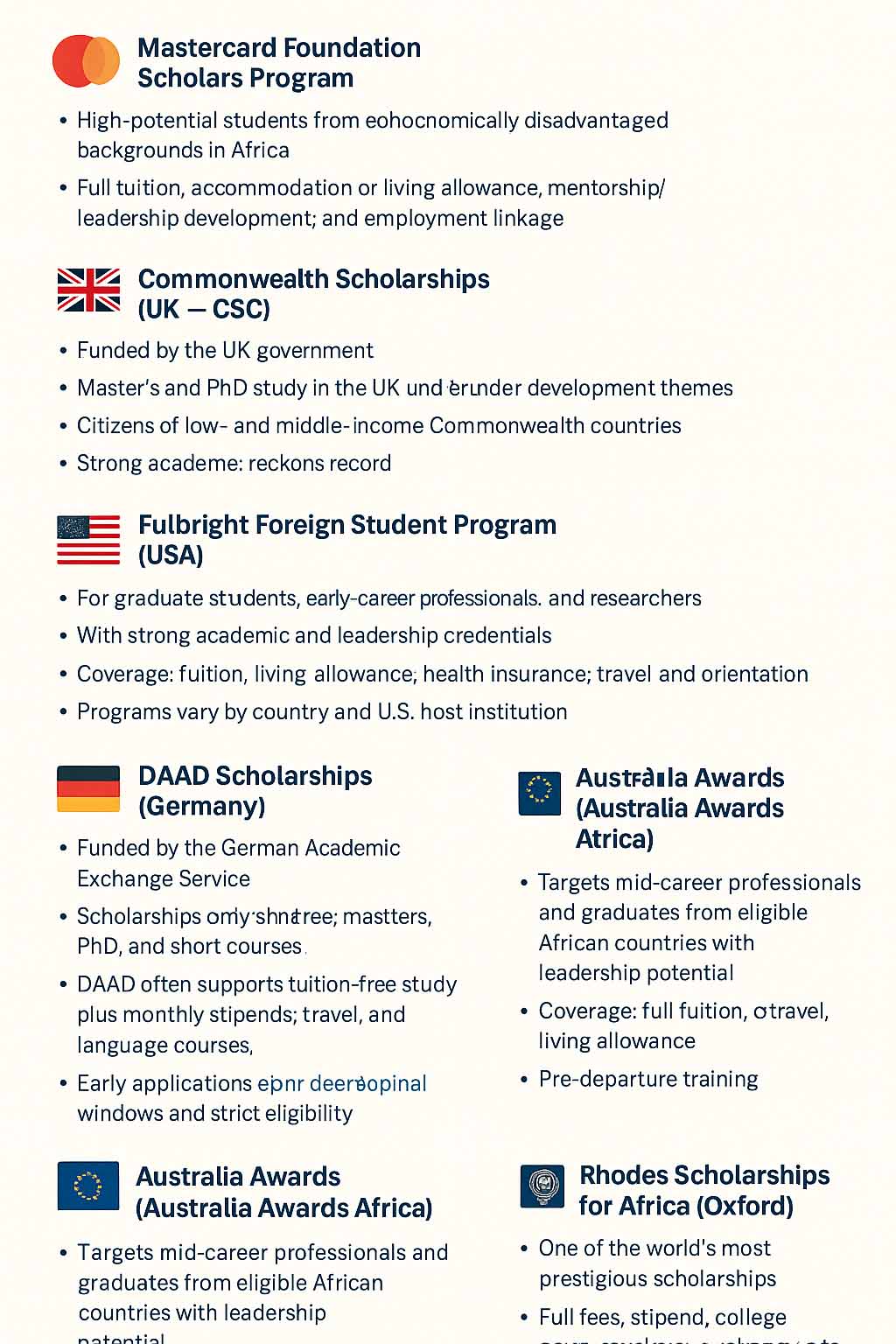

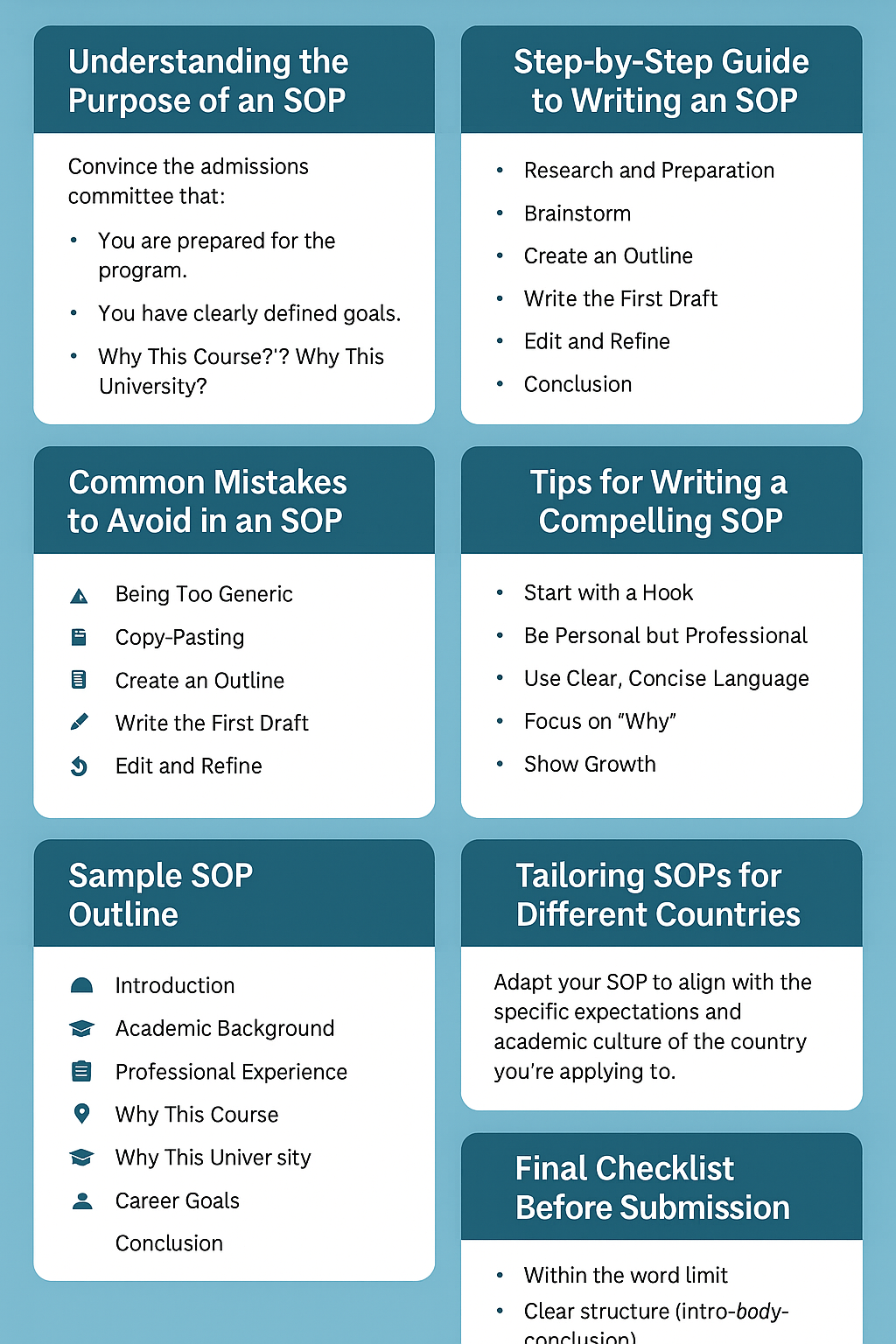
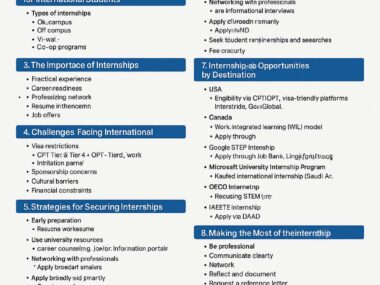
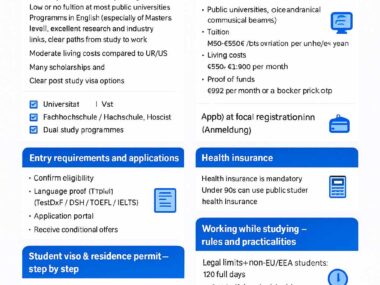
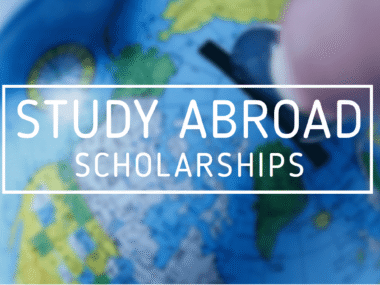
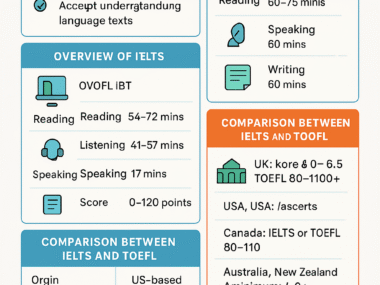
1 comment